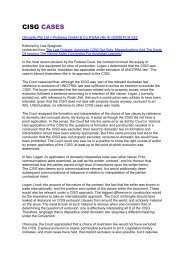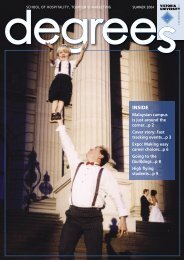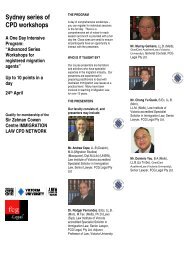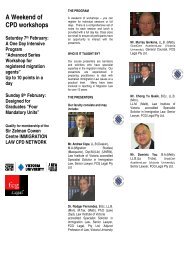A Glimpse Through the Kaleidoscope - Faculty of Business and Law ...
A Glimpse Through the Kaleidoscope - Faculty of Business and Law ...
A Glimpse Through the Kaleidoscope - Faculty of Business and Law ...
You also want an ePaper? Increase the reach of your titles
YUMPU automatically turns print PDFs into web optimized ePapers that Google loves.
LISA SPAGNOLO<br />
that this was a reason to opt out. 20 Insufficient familiarity seems significant in choice<br />
<strong>of</strong> law decisions in o<strong>the</strong>r jurisdictions too. 21<br />
2.2 LEARNING COSTS OF BECOMING FAMILIAR (YELLOW)<br />
Increasingly, commentators mention <strong>the</strong> time, cost <strong>and</strong> effort <strong>of</strong> becoming familiar<br />
with <strong>the</strong> CISG as a reason for opt-outs in certain jurisdictions. 22 Pr<strong>of</strong>essor Flechtner<br />
aptly refers to <strong>the</strong>se costs as „start up‟ costs since a large upfront expenditure is<br />
required initially but, like a manufacturing plant, once <strong>the</strong> investment in CISG<br />
knowledge is made, it can <strong>the</strong>reafter be amortised over long periods. 23 There is much<br />
evidence to support <strong>the</strong> idea that <strong>the</strong> costs <strong>of</strong> becoming familiar with <strong>the</strong> CISG, or<br />
learning costs, are significant in lawyers‟ choices <strong>of</strong> law. 24<br />
19<br />
Ibid. Unfamiliarity was not listed amongst options for respondents to select in <strong>the</strong> Meyer studies, in<br />
which <strong>the</strong> most frequent reason for opt-outs given by German, Austrian <strong>and</strong> Swiss lawyers was „not<br />
enough legal certainty‟. However, Meyer concludes from individual comments <strong>the</strong> reason for opt-outs<br />
may be that many lawyers <strong>and</strong> clients are unfamiliar with <strong>the</strong> CISG: Meyer, J., “The CISG in Attorney‟s<br />
Every Day Work” supra fn 3, at p. 8, Question 5, Tables 5A-4C.<br />
20<br />
Koehler, M. F., <strong>and</strong> Guo, Y., “The Acceptance <strong>of</strong> <strong>the</strong> Unified Sales <strong>Law</strong>” supra fn 6, at § IV.<br />
21<br />
Anecdotally, Hayakawa lists insufficient familiarity as one <strong>of</strong> <strong>the</strong> reasons for opt-outs in Japan:<br />
Hayakawa, S., supra fn 10, at pp. 225 <strong>and</strong> 227; McEvoy, J. P., “Canada” supra fn 10, at pp. 34, 37, 40,<br />
46-49 <strong>and</strong> 60-66. Widmer <strong>and</strong> Hachem‟s Swiss survey did not specifically provide „unfamiliarity‟ as an<br />
option for respondents as to why <strong>the</strong>y opted out. However, 42% responded that one reason for opt-outs<br />
was „lack <strong>of</strong> certainty‟ (multiple responses were permitted), which <strong>the</strong> authors attribute in part to<br />
insufficient familiarity <strong>and</strong> consequent lack <strong>of</strong> confidence ra<strong>the</strong>r than lack <strong>of</strong> awareness: Widmer, C. <strong>and</strong><br />
Hachem, P., “Switzerl<strong>and</strong>” supra fn 4, at p. 285.<br />
22<br />
Ziegel, J. S., “The Future <strong>of</strong> <strong>the</strong> International Sales Convention from a Common <strong>Law</strong> Perspective”<br />
(2000) 6 New Zeal<strong>and</strong> <strong>Business</strong> <strong>Law</strong> Quarterly 336, at p. 346 (mentioning „economic‟ reasons<br />
including „constraints <strong>of</strong> time <strong>and</strong> resources [that] may limit <strong>the</strong> amount <strong>of</strong> research <strong>the</strong>y are willing to<br />
do‟); Ziegel, J. S., “The Scope <strong>of</strong> <strong>the</strong> Convention” supra fn 11, at p. 345 (referring to costs <strong>of</strong> becoming<br />
familiar with <strong>the</strong> CISG as „economic‟ reasons for paucity <strong>of</strong> CISG cases in <strong>the</strong> US); Flechtner, H. M.,<br />
“Changing <strong>the</strong> Opt-Out Tradition in <strong>the</strong> United States” paper presented at „Modern <strong>Law</strong> for Global<br />
Commerce‟ Congress to Celebrate <strong>the</strong> 40th Annual Session <strong>of</strong> UNCITRAL, Vienna, 9–12 July 2007<br />
Spagnolo, L., supra fn 15, at p. 164.<br />
23<br />
Flechtner, ibid.<br />
24<br />
Koehler surmised that „a large number <strong>of</strong> <strong>the</strong> respondents have not yet taken <strong>the</strong> trouble to compare <strong>the</strong><br />
legal aspects <strong>of</strong> <strong>the</strong> [CISG <strong>and</strong> non-CISG domestic law] in detail‟: Koehler, M. F., “Survey regarding<br />
<strong>the</strong> Relevance” supra fn 1, at p. 10. One respondent remarked „you can‟t teach an old dog new tricks‟<br />
<strong>and</strong> ano<strong>the</strong>r pointed out <strong>the</strong> „steep learning curve‟ that lawyers faced in order to „buy into <strong>the</strong> CISG‟:<br />
ibid, at p. 3. A respondent to Fitzgerald‟s study commented that internal legal teams <strong>of</strong> multinational<br />
companies „do not have <strong>the</strong> time or occasion to try to determine whe<strong>the</strong>r <strong>the</strong> CISG […] might actually<br />
be favourable in a particular situation <strong>and</strong> choose instead to exclude <strong>the</strong>ir application because <strong>of</strong> <strong>the</strong> need<br />
for consistency in template agreements‟. Ironically, <strong>the</strong> same respondent <strong>the</strong>n detailed <strong>the</strong> apparent<br />
difficulties faced by such lawyers - how a „cookbook‟ <strong>of</strong> differences between U.S. <strong>and</strong> local law was<br />
kept when foreign domestic law applied because <strong>the</strong> „internal legal group [was] responsible for<br />
highlighting <strong>the</strong> differences [between U.S. <strong>and</strong>] non-U.S. law‟: Fitzgerald, P. L., “The International<br />
Contracting Practices” supra fn 2, at p. 106. In <strong>the</strong> Philippopoulos study <strong>the</strong>re were also comments to<br />
<strong>the</strong> effect that parties „would ra<strong>the</strong>r simply opt out <strong>of</strong> <strong>the</strong> CISG than to take <strong>the</strong> time to learn its<br />
provisions‟ <strong>and</strong> that <strong>the</strong>y found it „very confusing to figure out how it differs from reliance on [<strong>the</strong><br />
UCC]‟ or at least, did not want to „spend <strong>the</strong> time <strong>and</strong> money to figure it out so <strong>the</strong>y automatically opt<br />
out‟: Philippopoulos, G. V., “Awareness <strong>of</strong> <strong>the</strong> CISG” supra fn 2, at pp. 365-66. See also, Gopalan, S.,<br />
“A Dem<strong>and</strong>eur-Centric Approach to Regime Design in Transnational Commercial <strong>Law</strong>” (2008) 39<br />
140<br />
(2009) 13 VJ 135 - 156
















